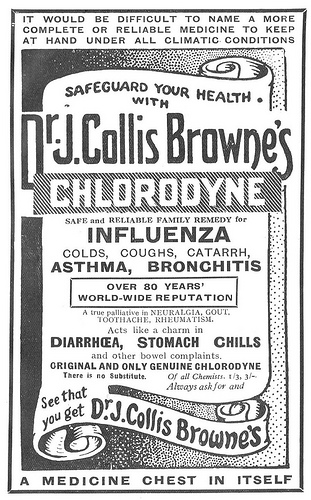The turn of the previous century saw a convergence of snake oil and snake oil salesmen, when patent medicines and the advertising industry combined their dubious skills to bombard America with an array of equally dubious nostrums which made ever more extravagant claims for themselves. Not until 1905, when Samuel Hopkins Adams published an exposé entitled “The Great American Fraud” in Collier’s Weekly did the political pressure start to build that led to the passage of the first Pure Food and Drug Act in 1906. That first food and drug act did not ban the alcohol, narcotics, poisons and stimulants in the medicines; but it did require them to be labeled as such, and curbed some of the more misleading, overstated or fraudulent claims that appeared on the labels.
Bonnore’s Electro Magnetic Bathing Fluid claimed to cure cholera, neuralgia, epilepsy, scarlet fever, necrosis, mercurial eruptions, paralysis, hip diseases, chronic abscesses, and “female complaints.” William Radam’s Microbe Killer had the extraordinary claim “Cures All Diseases” prominently embossed on the front of the bottle. Ebeneezer Sibley (“Dr Sibley”) in late 18th and early 19th century Britain went so far as to advertise that his Solar Tincture was able to “restore life in the event of sudden death,” amongst other marvels.
Lydia E. Pinkham‘s vegetable compound for women lives on in the 21st Century, except it is now found in economics, where ideological quackery has replaced fundamental economics.
WC is speaking, of course, of “expansionary austerity,” the ideological economic quackery that seems to be dominating the European Union and the neocon discussion of the U.S. economy. As far as WC can tell, the rationale can be summarized like this: Deficits are bad, therefore, reducing deficits cures every economic woe. From there, it was a short leap to the conclusion that deficit reduction would create jobs, making deficit reduction expansionary.
But, as in the case of any patent medicine, it’s a good idea to look at the ingredients before swallowing the stuff. Because the patient in this situation is the U.S. economy – indeed, the world economy – and if the patent medicine will make the patient sicker, swallowing it might be very, very bad indeed.
What “austerity” means is a reduction in government spending. Because the overwhelming majority of government spending is on employees, “austerity” usually means fewer government jobs. So what “austerity” really means is that its supporters intend to increase employment by increasing unemployment. You know, like you “cure” frostbite by rubbing snow on the frozen area. Or curing alcoholism with a patent medicine that is 40% alcohol by volume. It’s . . . counterintuitive . . . at best.
Dr. Paul Krugman has been railing against this economic nostrum since the Great Recession began. It’s contrary to everything economists learned in the Great Depression, and, under textbook economics, a quick ticket to a more serious recession or depression. Krugman speaks of invoking the “confidence fairy,” who will magically appear as a result of austerity and create boundless confidence in the economy, causing economic expansion. But whether you call it an imaginary confidence fairy or snake oil, it increasingly clear that the medicine hasn’t worked, doesn’t work and is making the patient sicker.
A recent European study shows British recovery is lagging behind the recovery from Great Depression, despite the harsh austerity measures imposed in Britain. Italy and Spain, whose economies have also been treated with the “expansionary austerity” snake oil, are similarly lagging, with Spain pretty clearly headed to a double-dip recession. The ingredients in the European economic quackery are making the patient worse.
And this is the stuff Republicans are trying to pour down the throat of the American economy. Not because it is based upon any understanding of economics, or has a logical or even plausible basis, but, in Krugman’s phrase, because “the doctrine of expansionary austerity dovetailed with their ideological agendas.”
In a real sense, it may already be too late because while we can talk about multiple national economies in Britain, Italy and Spain, in reality there’s only one patient, because all of the economies are so interdependent. There’s a real danger that the snake oil administered in Europe will poison the U.S. economy as well. But that’s no reason for the U.S. to make the same mistake. On all of the available evidence, and on 80 years of painful economic lessons, “expansionary austerity” is junk economics, patent medicine, and something to be avoided by any sensible person.


You must be logged in to post a comment.